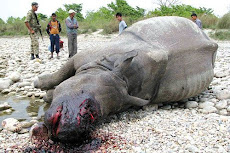Tourism entrepreneurs have expressed hope that the tourism industry will bounce back after the successful completion of the Constituent Assembly (CA) polls which, they hope, will bring about improvement in peace, and the law and order situation of the country.
"We are hopeful that the CA election will not only bring an overall change to the country but also create a conducive environment for hotels to operate freely and without fear," Kantipur quoted Hari Bhakta Ghimire, president of the Regional Hotel Association - Sauraha as saying. Stating that a weak law and order situation would push tourism back down, he said, "Lasting peace is necessary first to ensure any improvement in the tourism sector which has been in a major slowdown mode during the decade-long insurgency in the country."
During the conflict, some of the major hotels in Sauraha were closed down whereas others chose to run despite heavy losses due to a nominal flow of tourists.
Around five dozen tourist hotels are operating in Sauraha - the gateway to the Chitwan National Park - which is the third most popular tourist destination of the country. Suraj Mishra of the Temple Tiger lodge is also hopeful of improvement in the tourism sector after the CA polls.
"Foreigners are keeping a close watch on the ongoing peace process in Nepal and are also showing interest to make trips to this beautiful country," Mishra said. He said that the political changes in the country would have a positive impact in the economic sector.
"The number of bookings has gone up by 60 percent this year compared to last year," he said. “We will see further improvement in the arrival of tourists if the new legislative body brings lasting peace to the country."
Nepal Mountain News
"We are hopeful that the CA election will not only bring an overall change to the country but also create a conducive environment for hotels to operate freely and without fear," Kantipur quoted Hari Bhakta Ghimire, president of the Regional Hotel Association - Sauraha as saying. Stating that a weak law and order situation would push tourism back down, he said, "Lasting peace is necessary first to ensure any improvement in the tourism sector which has been in a major slowdown mode during the decade-long insurgency in the country."
During the conflict, some of the major hotels in Sauraha were closed down whereas others chose to run despite heavy losses due to a nominal flow of tourists.
Around five dozen tourist hotels are operating in Sauraha - the gateway to the Chitwan National Park - which is the third most popular tourist destination of the country. Suraj Mishra of the Temple Tiger lodge is also hopeful of improvement in the tourism sector after the CA polls.
"Foreigners are keeping a close watch on the ongoing peace process in Nepal and are also showing interest to make trips to this beautiful country," Mishra said. He said that the political changes in the country would have a positive impact in the economic sector.
"The number of bookings has gone up by 60 percent this year compared to last year," he said. “We will see further improvement in the arrival of tourists if the new legislative body brings lasting peace to the country."
Nepal Mountain News


